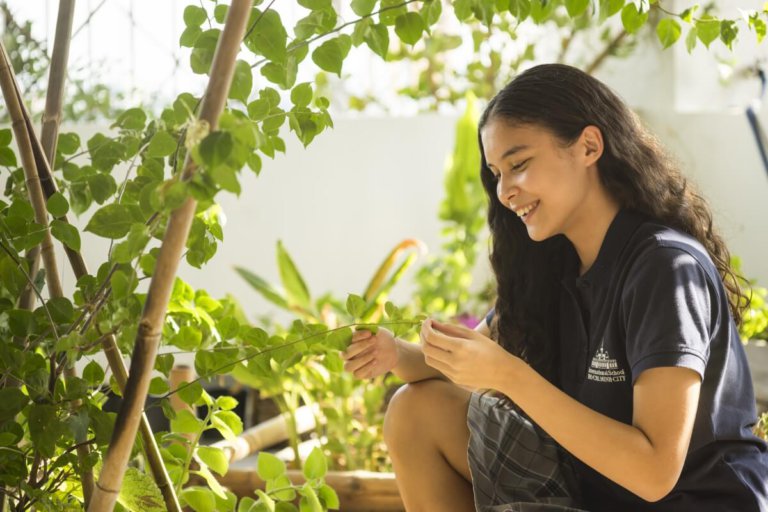
School communities must stick together. The current pandemic is a testament to this.
Through a cohesive campus community, it is possible for students to be safe and healthy, with no compromise to their academic progress.
It goes beyond shifting education online. International schools in Asia are making daily deliveries of schoolwork, even laptops, tablets and Wi-Fi hot spots. Teachers hold daily virtual Zoom sessions with students. Administrators meet daily to check on the academic and emotional well-being of students. Digital learning tools — from Google Hangouts to Microsoft Teams — are being implemented full force.
Everyone is doubling down to keep learning going.
With team spirit and support, schools are proving that they can remain focused despite lockdowns, with the added benefit of students and faculty learning the true value of community.
A recent study by National University of Singapore psychology researchers Francesca Wah and Tick Ngee Sim also found that teamwork impacts academic performance.

Source: Jerudong International School
Wah and Sim recruited 1,005 students from three government-aided, co-educational Singapore primary schools to see if a common goal of winning encourages students to perform better at tasks. They found that children of all abilities who competed in groups against other teams for rewards such as actual prizes and verbal praise achieved higher scores. Students also said they prefer a team-learning approach to an independent-study approach.
“Co-operation plays a key role in cultivating social connectedness,” said Wah.
These unprecedented times call for nothing less. Here are four international schools in Asia with supportive campus communities keeping students inspired and engaged.
INTERNATIONAL SCHOOL HO CHI MINH CITY (ISHCMC) — VIETNAM
At International School Ho Chi Minh City (ISHCMC), community comes first.
The investments it has made over the past three months to safeguard students and faculty as well as adapt to COVID-19 is exemplary in its depth and breadth.
This stems from ISHCMC’s deep-rooted culture of care to balance academic outcomes with the social and emotional needs of the community given the current environment.

Source: International School Ho Chi Minh City
With the support of an experienced Student Support Service team, a number of Wellbeing Guides were developed aimed at keeping parents and students engaged and empowered through challenging times. Emotional support is available to caregivers and learners virtually as needed.
This holistic response is well-received by ISHCMC’s students and parents alike. They are grateful to have compassionate leaders at ISHCMC who have offered stability to keep the community spirit alive. This is particularly true for Grade 12 students, who are about to embark into a post-COVID-19 world.
ISHCMC Secondary School Principal Will Hurtardo said, “We are defined as humans not by the situations put in front of us but by the way we face them, respond to them and overcome them. More than ever, you have faced adversity with courage and resilience in a way we find truly humbling. The future is full of optimism and hope because you are the people shaping it.”
Read more about how ISHCMC’s Class of 2020 responded during school closures and their success stories getting accepted to the top universities around the world.
JERUDONG INTERNATIONAL SCHOOL (JIS)- BRUNEI
At Jerudong International School, community spirit is at the centre of everything that students do.
For instance, the Middle Years (Years 7-9) community follow the “Way of the Meerkat”.
Meerkats are renowned for working together, and older meerkats mentor the younger ones. Middle Years students are encouraged to think about the role they each play in creating a community at JIS and influencing Junior School students.

Source: Jerudong International School
In the Upper Years (Years 10-13), the curriculum focuses on the core values of JIS: resilience, positive relationships, thinking, healthy living and mental health. These values help to create an engaging and cohesive learning experience for all.
JIS Wellbeing Captains also receive Mental Health First Aid training and are free to organise events such as “Random Acts of Kindness Day” and “Mental Health Day”.
Through its Polio Points programme, students get to earn points by achieving their school’s aims. If a student achieves all of the aims, JIS then donates money to UNICEF to pay for one Polio vaccination (sponsored by Aetna) — last year, their efforts paid for 8,265 polio vaccinations in developing nations.
These initiatives show the holistic approach JIS takes to instill global citizenship in its students. At JIS, it’s always an encouraging environment for students to reach out to others and to think about how their actions have a positive impact on their peers.
BANGKOK PATANA SCHOOL — THAILAND
It did not take long for Bangkok Patana School to act to keep its campus community safe. From mandating temperature scans and providing masks, this international school put its students and faculty’s safety first and foremost.
And once international schools in Asia are allowed to open again, Bangkok Patana will continue to prioritise the safety of its pupils by abiding the Thai government’s safety guidelines.

Source: Bangkok Patana School
Bangkok Patana also prepares students for future challenges through a broad range of subjects explored within the International Baccalaureate (IB) and outdoor learning.
For instance, Year 3 students get to learn in an Outdoor Classroom where they interact with nature, plan gardens and create their own tropical fruit, vegetable and herb patches. Secondary students learn to look beyond their personal needs and make a positive impact on society at large via community service, gaining valuable experience and networking opportunities in the process.
Through this process, students gain a greater understanding of their responsibility to contribute to the global sustainability movement.
SINGAPORE AMERICAN SCHOOL — SINGAPORE
Singapore American School (SAS) is an international school with heart.
To keep their community safe during the pandemic, they closed their campus and decided to integrate distance learning into their curriculum.

Source: Singapore American School
Alongside temperature checks, temperature screening slips are issued to ensure that all students, parents and educators are healthy before coming to campus.
Student wellbeing is paramount and the school’s eco-conscious campus also shows their community how sustainability helps to build a better world.
Their campus sits by a two-acre natural rainforest that their science classes use as a living laboratory, and they have one million kilowatt-hours of electricity running through their campus solar panels.
Through this commitment to sustainability and student safety, SAS is setting an example for schools around the world.
*Some of the institutions featured in this article are commercial partners of Study International
Liked this? Then you’ll love…
ISHCMC: Empowering students to drive the sustainability agenda
3 international schools in Asia that prepare students for future success







